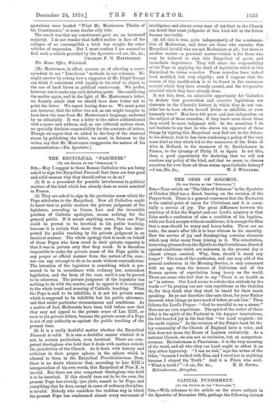THE ENCYCLICAL " PASCENDL"
[To THE EDITOR OF THE "SPECTATOR."] Sin,—May I suggest to those Roman Catholics who are being asked to sign the Encyclical Pascendi that there are four good and solid reasons why they should refuse to do so ?
(1) It is a precedent for possible interference in political matters of the kind which has already done so much mischief in France.
(2) They are asked to sign in the particular sense which the Pope attributes to the Encyclical. Now all Catholics ought to know that in public matters the private judgment of the legislator, according to Canon Law and the invariable position of Catholic apologists, means nothing for the general public. If it meant anything more, then one Pope could be proved to be heretical in his public teaching, because it is certain that more than one Pope has inter- preted his public teaching by his private judgment in an heretical manner. The whole apology that is made on behalf of those Popes who have erred in their private capacity is that it was in private only that they erred. It is therefore impossible to make the private sense of the Pope public in any proper or official manner from the nature of the case ; nor can any attempt to do so be made without contradiction. The intention of the legislator is something which is pre- sumed to be in accordance with ordinary law, antecedent legislation, and the facts of the case, until it can be proved to be otherwise. The private judgment of the legislator has nothing to do with the matter, and to appeal to it is contrary to the whole trend and meaning of Catholic teaching. When the Pope is said to be infallible, it is not his private sense which is supposed to be infallible but his public utterance, and that under particular circumstances and conditions. As a matter of fact, Modernists have been told before now that they may not appeal to the private sense of Leo XIII., or even to his private letters, because the private sense of a Pope is not of any authority as against the public teaching of the present time.
(3) It is a really doubtful matter whether the Encyclical Pascendi is valid. It is also a doubtful matter whether it is not, in certain particulars, even heretical. There are com- petent theologians who hold that it deals with matters outside the jurisdiction of the Church. As it deals with history and criticism in their proper sphere, in the sphere which is allowed to them in the Encyclical Providentissimus Deus, there is no doubt whatever that, according to Leo XIII.'s interpretation of his own words, this Encyclical of Pius X. is invalid. But there are also competent theologians who hold it to be heretical. If this should turn out to be the case, the present Pope has already, ipso facto, ceased to be Pope, and everything that he does, except in cases of ordinary discipline, is invalid. Nobody who considers the reckless way in which the present Pope has condemned almost every movement of
intelligence and almost every man of intellect in the Church can doubt that some judgment of this kind will in the future become inevitable.
(4) All this is true, quite independently of the condemni- tion of Modernism, and there are those who consider this Encyclical invalid who are not Modernists at all ; but there is another matter—a practical matter—which is for those who may be induced to sign this Encyclical of grave and immediate importance. They will share the responsibility of the Pope in applying the kind of legislation which in this Encyclical he terms remedies. These remedies have indeed been modified, but very slightly ; and I suppose that the reason of this modification is to be found in the enormous scandal which they have already caused, and the irreparable mischief which they have already done.
Is not this, then, an admirable opportunity for Catholics to declare that persecution and coercive legislation are elements in the Church's history in which they do not con- sider her to have shown herself divine or infallible, or even humanly wise ? Men have felt great and just indignation on the subject of these remedies ; if they knew more about them they would be more indignant still. In the meantime I do not hesitate to say that he who shows his approval of these things by signing this Encyclical may find out in the future, to his dismay, that he has been condoning a policy of the very same kind as that which led to the massacres of the Duke of Alva in Holland, to the massacre of St. Bartholomew in France, to the tyranny of Philip II. in Spain. Is not this, then, a good opportunity for declaring that we will not condone any policy of the kind, and that we mean to cleanse ourselves for ever from all these stains upon Catholic history ?






































 Previous page
Previous page